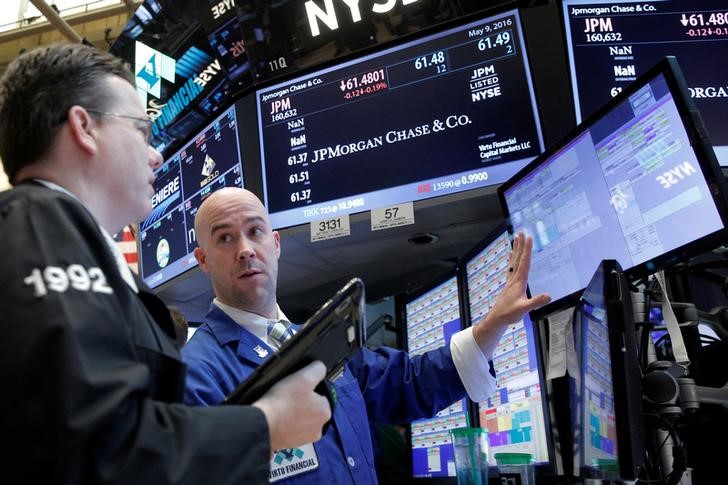By Lewis Krauskopf
NEW YORK (Reuters) - The yen tumbled against the U.S. dollar on Monday as Japan signalled it was ready to intervene in the currency market, while a sharp drop in oil prices undercut equities.
U.S. stock indexes ended mixed as healthcare shares helped counter a 1.2 percent drop for the S&P energy sector (SPNY). Europe's broad stock index gained, supported by a 1.1 percent rise for Germany's DAX index (GDAXI) on positive news for the country's economy.
U.S. Treasury yields fell as investors lowered estimates that the Federal Reserve will raise interest rates in June, after Friday's weaker-than-expected April jobs report.
China's exports and imports fell more than expected in April, underlining weak demand at home and abroad and weighing on materials stocks as well as copper prices.
"There is, and there has been for the last week or so, a bit of a risk-off tone to the markets with concern about the economy," said Tim Ghriskey, chief investment officer of Solaris Asset Management in New York. "There is a growing concern about the U.S. economy and global economies."
The Dow Jones industrial average (DJI) fell 34.72 points, or 0.2 percent, to 17,705.91, the S&P 500 (SPX) gained 1.55 points, or 0.08 percent, to 2,058.69 and the Nasdaq Composite (IXIC) added 14.05 points, or 0.3 percent, to 4,750.21.
The benchmark S&P 500 is up slightly in 2016 after recovering from a rough start to the year, with volatility in oil prices causing jitters in other markets.
"To break out and rally above the recent highs, we need oil to stabilise in the $40 to $60 range," said Jack DeGan, chief investment officer at Harbor Advisory in Portsmouth, New Hampshire.
Europe's broad FTSEurofirst 300 index (FTEU3) climbed 0.5 percent.
Brazil's benchmark Bovespa stock index (BVSP) fell 1.3 percent, while its currency weakened 0.6 percent against the dollar
MSCI's world equity index (MIWD00000PUS) slipped 0.3percent after posting its worst weekly performance since mid-February last week.
The U.S. dollar gained 1.2 percent against the yen. Japanese Finance Minister Taro Aso said Tokyo is ready to intervene if yen moves are volatile enough to hurt the country's trade and economy.
The Japanese currency last week hit a 1-1/2 year high against the greenback.
"There is a risk of either currency intervention or BOJ (Bank of Japan) monetary policy easing in the months ahead, a risk that is, at least for now, keeping the yen's upside limited," said Omer Esiner, chief market analyst at Commonwealth Foreign Exchange in Washington.
Against a basket of currencies, the dollar (DXY) gained 0.26 percent.
Oil prices slid on expectations that U.S. crude inventories would again build to record highs, taking the market's focus off swooning Canadian oil output due to raging wildfires.
U.S. crude (CLc1) settled down 2.8 percent at $43.44 a barrel, while benchmark Brent (LCOc1) settled off 3.8 percent at $43.63 a barrel. Oil prices have recovered some ground after touching 12-year lows earlier in 2016.
U.S. Treasury yields fell as investors evaluated when the Fed is likely to raise rates.

Benchmark 10-year notes (US10YT=RR) were last up 7/32 in price to yield 1.7525 percent, down from 1.777 percent late on Friday.